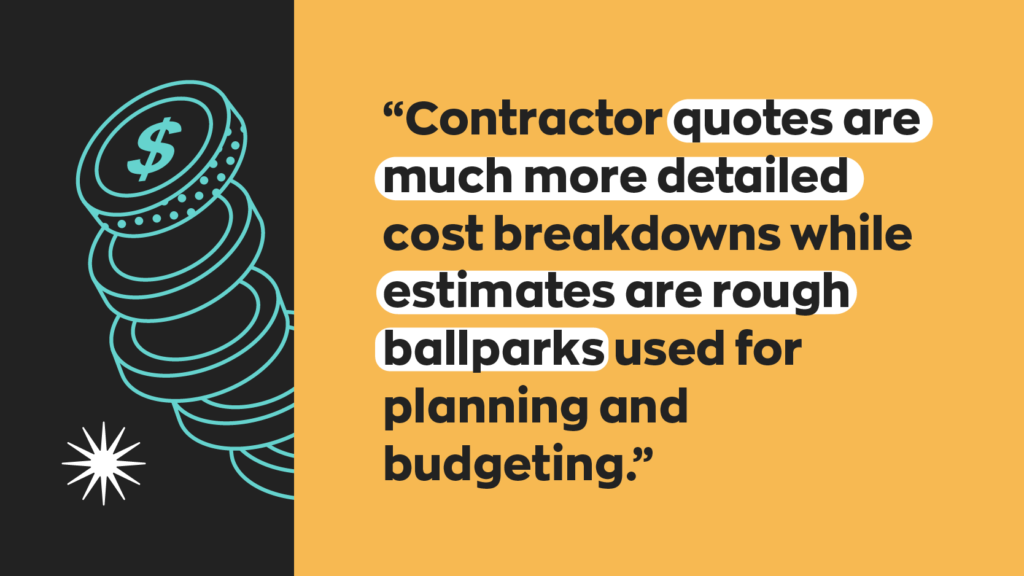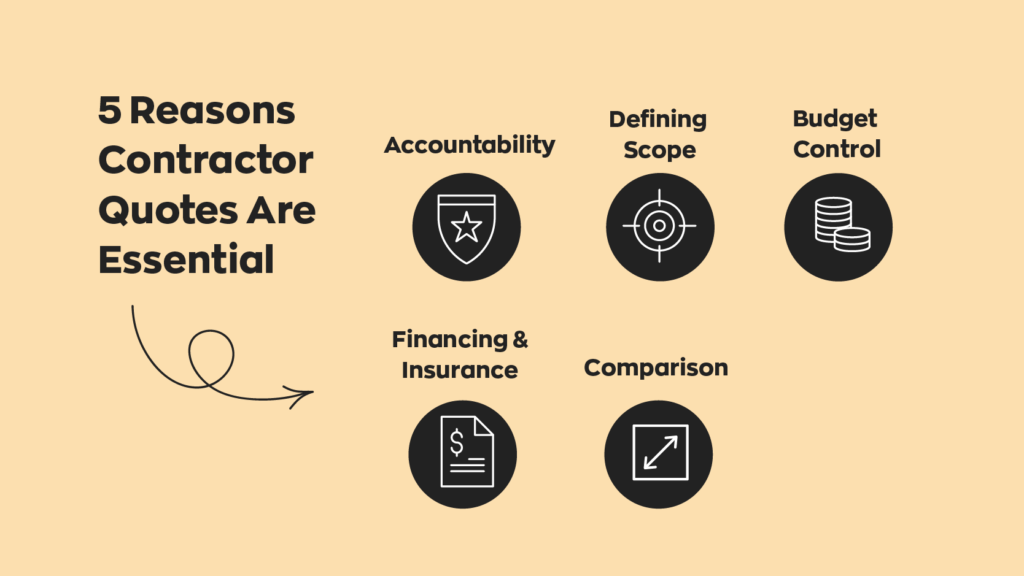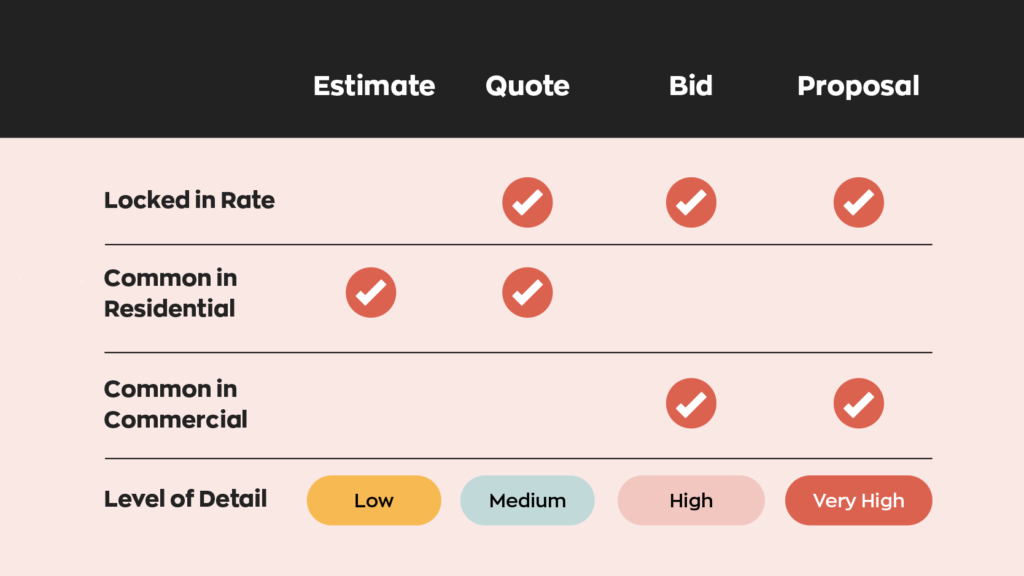Key takeaways
- Contractor quotes are in-depth, legally binding agreements that specify exact costs, services, exclusions, and timelines; they often include a “valid until” date to protect contractors from unforeseen changes.
- Estimates are rough, non-binding cost approximations used for initial planning and budgeting; they provide a general overview of services, labor, timelines, and potential exclusions.
- Both estimates and quotes serve as essential documents that contractors should use throughout a project to aid in defining scope, budget control, accountability, and post-project financial reporting.
- Bids are typically used for large-scale public or commercial projects, where contractors submit proposals in response to detailed project specifications provided by clients.
- Contractors should only provide quotes after thoroughly assessing project requirements through client discussions, site visits, or research to ensure accuracy and feasibility.
If you’re new to working with a contractor (or maybe you’re a new contractor yourself), you’ll often hear a few terms, such as quotes, estimates, bids, and proposals. While many use these terms interchangeably, there are some small but significant differences between them. So: what is a quote vs. estimate? What do you need to know about contractor quotes? Is there specific information contractor quotes should include? What about bids and proposals?
There’s a lot to talk about here, so let’s jump in without further ado!
Quote vs. estimate: what’s the difference?
Contractor quotes and contractor estimates are similar. They use both these documents to give clients an idea of how much the project will cost. As with many things, though, the difference lies in the details.

An estimate is a high-level but straightforward overview of the work that a project requires. Estimates include a breakdown of necessary services and labor, a rough timeline, and potential exclusions regarding unforeseen issues. Because estimates are meant to be a rough, well, estimate, they are not legally binding documents.
Contractor quotes, on the other hand, are legally binding (if accepted and signed) and are much more in-depth. Contractor quotes include the breakdown of services required and any exclusions, but they offer a more concrete timeline. Because quotes are legally binding, they also usually include a “valid until” date in order to protect the contractor. This prevents potential customers from forcing workers into an impossible contract.
For contractors, it’s essential that you never give out a quote until you’re certain about the costs and labor required. This could involve speaking directly with the customer, walking through the project site, or doing external research.
In short, the difference between a quote and an estimate is accuracy. While both documents tend to hold the same information, contractor quotes are much more in-depth.
Why are contractor quotes important?
There’s quite a few reasons why contractor quotes are so important. Perhaps most importantly, they’re legally binding. If a client agrees on a price and tries to renege on it, they’ll end up in legal trouble. A lot of legal trouble.
Both estimates and quotes also serve as documentation during and after a project. They ensure that the customer gets what they want and that the contractor has something to work off of. They’re also helpful for creating financial reports later down the line.

What is a bid?
Bids are different than estimates or contractor quotes. They contain similar information but are used in a completely different sector of the field service industry. Bids are generally used in the context of massive military or commercial projects. Think of something like a new highway system or a public park. These projects are usually massive in scope, and small businesses have a much harder time competing for these projects. There are several reasons for this, but the main one is the considerable overhead needed to get projects like this off the ground.
How do bids work?
Bids also work a bit differently than contractor quotes.
When the government or a large commercial agency has a project in mind, they make the necessary specifications publicly available.
Companies and small businesses then place bids on the project, outlining how much time and money the project will cost. This process continues until the agency accepts a bid.
Generally, bids will include more details than an estimate or contractor quote. This sort of work tends to be larger, resulting in a larger payout. The more detailed your bid, the more you’ll stand out compared to the competition.
While bids are exceptionally common in the construction industry, they’re also used in other areas. For example, through bids, Elon Musk’s SpaceX has received over $15 billion in government contracts since 2003.
What is a proposal?
Proposals are a bit different than the documents we’ve discussed above. Instead of an agreement between two parties, contractors use proposals to try and win a potential customer’s business.
If you think of contractor quotes as the next “step up” from estimates, then proposals are the next step up. They contain the same information as quotes and estimates but are extremely specific. Businesses also use proposals to showcase the value they bring to a project. This could be cost-saving measures, expertise in the type of project, or an accelerated timeline.
When will you use proposals?
You can expect to create a proposal in a handful of situations. A potential customer could ask you to send them a pitch, or they may want you to compete with others. Whatever the case, proposals are important. Not only are they an important part of showing off your expertise, but they also help show that you’re the best fit.

Why are contractor quotes, estimates, bids, and proposals important?
Estimates, contractor quotes, bids, and proposals are all an important part of the field service industry. On top of serving as a legal fallback, they document what materials and labors are in use. This helps businesses stay organized because the relevant information is easily accessible.
Most contractors can make use of quotes, but not all can. Because contractor quotes are legally binding, they tend to be inflexible. There are some industries that change so quickly that it’s challenging to forecast every necessary exclusion. In fields like these, using quotes could end up being a money sink.
How can you keep track of everything?
Before the advent of the internet, everything was done with pen and paper. Businesses would physically send contractor quotes, receive a signature, and then file it away in a cardboard box.
Outside of contractor quotes, they also had to assign workers to different sites and make sure they were carrying the necessary equipment. And then they had to go and document all that, too!
These days, businesses use software to handle most of these things. For example, field service management software such as inFlow can help you better track your inventory, calculate your cost of goods sold (COGS), run reports, and much more.
Another fantastic function that can help automate a lot of your workflow is the integrated barcode system built right into the software. Keeping track of equipment is as simple as scanning a barcode. The same barcoding software makes it easy to track material stocks, ensuring you’ll never have to put things on pause.






0 Comments